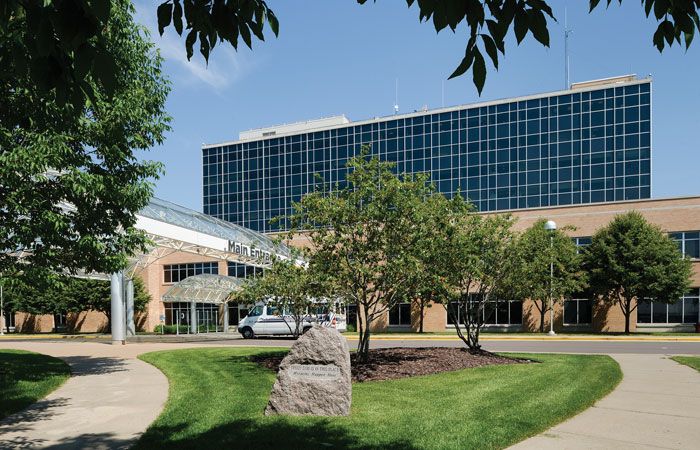Wisconsin hospitals close their doors
Two hospitals that served patients for more than a century shut down Friday. Hospital Sisters Health System said financial challenges led to the closure of the facilities.
In Wisconsin, two hospitals that have served their communities since the latter part of the 19th century have closed their doors for good.
Sacred Heart Hospital in Eau Claire, Wisc., and St. Joseph’s Hospital in Chippewa Falls, Wisc., both operated by HSHS, closed for good Friday.

Sacred Heart Hospital in Eau Claire and St. Joseph’s Hospital in Chippewa Falls both officially closed Friday morning. The Hospital Sisters Health System, which had operated the two hospitals, announced plans to close the facilities in January.
Prevea Health, a physician network providing primary and specialty care, is also closing its locations in western Wisconsin’s Chippewa Valley in April. More than 1,400 people are losing jobs, including 1,082 HSHS employees and 325 Prevea physicians and staffers.
Eric Borgerding, president and chief executive officer of the Wisconsin Hospital Association, told Chief Healthcare Executive® that the closure of the hospitals is a serious blow to those communities.
“When you have not one but two hospitals close in a community, it's not just a shock, because the inpatient capacity disappears over the course of a couple of months,” Borgerding said in an interview. “It's also everything else that those hospitals were supporting, which is substantial, and which is an increasing challenge to continue to do.”
Elected officials in Wisconsin, including Gov. Tony Evers and U.S. Sen. Tammy Baldwin, D-Wisc., have expressed their disappointment about the closure of the hospitals. Local officials said the closures will make it harder for patients to get access to the care they need.
Sacred Heart Hospital, which had 192 beds, began serving Eau Claire in 1889. St. Joseph’s Hospital, with about 100 beds, began operating in Chippewa Falls in 1885. Both hospitals had messages on their websites Friday morning confirming their closure. Sacred Heart shut down at 7 a.m. Friday, and St. Joseph’s closed at noon Friday.
“Thank you for entrusting Sacred Heart with your health care,” the hospital’s website states. “We are privileged to have been able to fulfill the Hospital Sisters mission in this community for more than 140 years. We are forever grateful to the clinicians and colleagues whose care and compassion made a difference to those we served.”
A similar message was posted on the St. Joseph’s website. Both sites reminded patients they could still access their medical records through the MyChart portal, and they should call 911 for emergencies.
Financial challenges
Members of the community, former employees and emergency responders gathered and walked outside the hospitals this week as a show of support, the Leader-Telegram and other Wisconsin media reported.
HSHS, a faith-based system, operates 13 hospitals and a host of physician practices in Illinois and Wisconsin. HSHS pointed to a host of financial difficulties in the closure of the two hospitals.
In a news release, the system cited the fallout from the pandemic, inflation, as well as “workforce constraints, local market challenges and other industry-wide trends.”
Damond Boatwright, president and CEO of HSHS, said the health system and Prevea struggled with a “mismatch in the supply of and demand” for healthcare services.
“We closely considered all other options and sought strategic alternatives,” Boatwright said in a statement. “After an agreement with a suitable partner did not work out, it was determined that exiting the market is the only feasible path forward.”
HSHS said it’s providing severance and transition assistance to the affected employees.
‘Dismayed, troubled, and surprised’
Wisconsin’s governor called the closure of the hospitals a “shock.”
"I'm incredibly disappointed as governor because of how this happened and how it was handled, frankly it's wrong," Evers said at a public meeting in February, WQOW-TV reported.
Sacred Heart Hospital was initially slated to close in April, but the closure was moved up to Friday. John Wagner, president and CEO of Sacred Heart, said in a statement that the accelerated closure was necessary.
“While the March closure of Sacred Heart is sooner than originally announced, our decision is based on our top priority: our commitment to maintain safe, quality care for our patients,” Wagner said in a statement.
Stephanie Hirsch, the city manager of Eau Claire, said via email to Chief Healthcare Executive that she was deeply disappointed by the closure of Sacred Heart, and the earlier shutdown of the facility.
“We join with the rest of the community in feeling very dismayed, troubled, and surprised by the sudden closure announcement, which became even more sudden with the accelerated closure date. I have spoken to many staff and patients, and they have shared that it has been surreal and deeply upsetting to witness the very rapid winding down and displacement of staff and patients from within Sacred Heart,” Hirsch said.
The city is looking for new potential healthcare partners in the short term, while also joining others in the push for better reimbursement of Medicare and Medicaid, she said. Hirsch praised “the amazing health care professionals who live and work among us.”
“We are so grateful to them for their work, and we promise to work as hard as we can to ensure that our community remains strong and healthy,” she said.
Some other hospitals in Wisconsin, and hospitals around the country, have faced serious financial difficulties since the COVID-19 pandemic.
The Marshfield Clinic Health System announced furloughs of about 3% of its staff in January. With a workforce of more than 12,000 workers, that would represent about 360 employees. In January, Marshfield Clinic and Essentia Health issued a joint statement saying that they were dropping plans for a merger.
Telehealth faces a looming deadline in Washington | Healthy Bottom Line podcast
February 12th 2025Once again, the clock is ticking on waivers for telemedicine and hospital-at-home programs. Kyle Zebley of the American Telemedicine Association talks about the push on Congress and the White House.